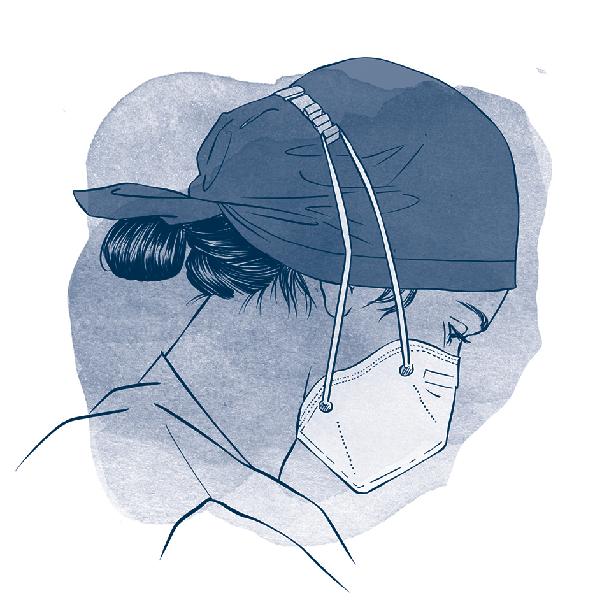
4 minute read
I wouldn’t change what I went through
constanza núñez Nurse Bupa Reñaca Hospital
On 10 June I woke up with no sense of taste or smell, which we call anosmia and ageusia. I couldn’t taste anything. I called my boss, Carol, and said: I don’t have any taste or smell, I am scared. She said: come to the hospital straight away and we will do the pcr test. Then I went into quarantine. My first pcr test was negative but a second one, fifteen days later, was positive. I was infected by a patient who had Covid and had an anxiety disorder that was not well-controlled. I was coming off my break and he was having a crisis in the corridor and I had to put cold compresses on him. He came in walking and an hour later he was confused, aggressive and needed a ventilator. He was 58 years old and had no underlying illnesses. This happens with hypoxia: the lack of oxygen in the brain makes them confused and overwhelmed. It was really difficult to keep a distance from my family. I knew I had Covid, even though the first PCR test was negative, because the symptoms were obvious. I am the oldest daughter. I have a sister of 21 years old and my parents are still young, so we have a great relationship. Telling my parents I was ill and they couldn’t come over but not to worry was hard. They left me food at the door. I would just put the rubbish out.
REÑACA — CHILE
It took me a month to get over it – that was the longest month ever. I felt that I wouldn’t die of Covid. I think I was most afraid of getting a blood clot, so I tried to do exercises lying down, as I spent all the time lying down. I couldn’t get up. I didn’t have enough breath to get up. Just going to the bathroom was awful. I would shower sat on the tub. The steam suffocated me. Everything was horrible. I lost six kilos, but I kept going. As I had a high fever, I didn’t even really know what was going on. If the world had ended I would have ended with it. I wasn’t fully aware of anything. On 30 June I started to be able to smell a few things again. I remember crying when I could smell coffee again. I went back to work on 13 July. I knew I would have to get used to using a mask again, so two days before going back, I spent the day wearing it to get me used to full-time mask wearing. I am one of the lucky ones because once I recovered, my scans came out clean. I don’t have any after effects except a bit of a cough which might last a long time. As a hospital, in the Region of Valparaíso we had just one emergency department until March, and everything was dealt with there. From one week to another we divided up the work flow and the emergencies and that was when we started using surgical If the world had masks and full gear. ended I would have ended with it. During the first few weeks of April the virus was getting out of hand and we started to see changes in symptoms: at first it was just fever and respiratory symptoms, then in the first I wasn’t fully aware weeks of May gastrointestinal symptoms and then people with of anything. diarrhoea and vomiting were also suspected of having Covid. In April, we saw the first respiratory problems: someone who came into the hospital with normal saturation levels and after less than an hour their levels went down and they needed urgent mechanical ventilation. In July, patients were coming in in a worse state, because people were afraid of coming in and waited until the last minute at home. So they would come into the emergency department, already gravely ill. Covid is airborne, so although nebulisers are useful we can’t use them, because the virus is transmitted that way. The other thing that made it difficult during the pandemic was the way we dealt with Covid patients. As soon as they were being treated, accompanying people and visitors were restricted, so people preferred not to come to hospital if possible.
Personally, I think alongside the vaccine, health education is what will change things. They will be small changes, but they are needed and we will need to live with them. For example, hand-washing, which people weren’t very aware about before, but is now an essential part of our habits. We are social beings and have found it difficult to keep our distance from each other. I think there will be consequences to this difficulty to get close to people. Going back to work, for example, I found out that a paramedic on our team had been diagnosed with terminal cancer. We are supporting each other and taking it a day at a time. We have aromatherapy, background music and group activities, but I think after the pandemic we will need to get more personal, closer to people. I have been an emergency nurse at the clinic for five years. I am 28 years old and have never doubted that this is what I am here for. Nursing is my life and breath. I love it. I wouldn’t change from nursing, or change what I went through. I am thankful for the opportunity to develop professionally and I wouldn’t change my job for the world. �








